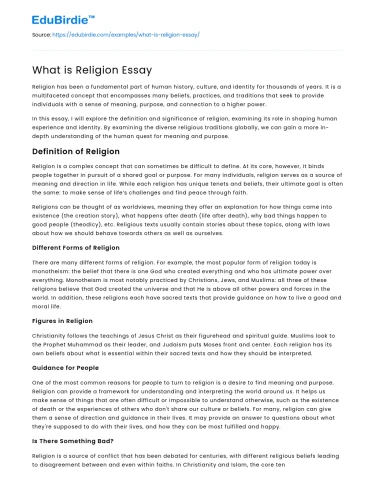Religion has been a fundamental part of human history, culture, and identity for thousands of years. It is a multifaceted concept that encompasses many beliefs, practices, and traditions that seek to provide individuals with a sense of meaning, purpose, and connection to a higher power.
In this essay, I will explore the definition and significance of religion, examining its role in shaping human experience and identity. By examining the diverse religious traditions globally, we can gain a more in-depth understanding of the human quest for meaning and purpose.
Save your time!
We can take care of your essay
- Proper editing and formatting
- Free revision, title page, and bibliography
- Flexible prices and money-back guarantee
Definition of Religion
Religion is a complex concept that can sometimes be difficult to define. At its core, however, it binds people together in pursuit of a shared goal or purpose. For many individuals, religion serves as a source of meaning and direction in life. While each religion has unique tenets and beliefs, their ultimate goal is often the same: to make sense of life’s challenges and find peace through faith.
Religions can be thought of as worldviews, meaning they offer an explanation for how things came into existence (the creation story), what happens after death (life after death), why bad things happen to good people (theodicy), etc. Religious texts usually contain stories about these topics, along with laws about how we should behave towards others as well as ourselves.
Different Forms of Religion
There are many different forms of religion. For example, the most popular form of religion today is monotheism: the belief that there is one God who created everything and who has ultimate power over everything. Monotheism is most notably practiced by Christians, Jews, and Muslims: all three of these religions believe that God created the universe and that He is above all other powers and forces in the world. In addition, these religions each have sacred texts that provide guidance on how to live a good and moral life.
Figures in Religion
Christianity follows the teachings of Jesus Christ as their figurehead and spiritual guide. Muslims look to the Prophet Muhammad as their leader, and Judaism puts Moses front and center. Each religion has its own beliefs about what is essential within their sacred texts and how they should be interpreted.
Guidance for People
One of the most common reasons for people to turn to religion is a desire to find meaning and purpose. Religion can provide a framework for understanding and interpreting the world around us. It helps us make sense of things that are often difficult or impossible to understand otherwise, such as the existence of death or the experiences of others who don't share our culture or beliefs. For many, religion can give them a sense of direction and guidance in their lives. It may provide an answer to questions about what they're supposed to do with their lives, and how they can be most fulfilled and happy.
Is There Something Bad?
Religion is a source of conflict that has been debated for centuries, with different religious beliefs leading to disagreement between and even within faiths. In Christianity and Islam, the core tenets of each faith differ significantly regarding topics such as the divinity of Jesus, the existence of a single god or three, and other essential matters. Despite the inherent conflicts between each religion, both have risen to great power throughout history, inspiring art, literature, and architecture, as well as influencing societal norms.
The argument over religion often leads to heated debates on whether religious tolerance is beneficial or if it promotes adopting false beliefs. Others assert that regardless of any potential conflict or not, diversity should be embraced and encouraged in its own right. These views comprise only a fraction of the vast spectrum of perspectives regarding religion and its societal effects.
Religion Has its Two Sides
Religion is a topic that evokes varied opinions, yet it remains shrouded in mystery for many. Its significance in the modern world and its enduring influence on human cultures leave people perplexed. While some view religion as an archaic and outdated concept, it continues to profoundly shape society and culture. Although it has its drawbacks, religion plays a crucial role in the lives of many individuals. Its value is subjective; it provides meaning, purpose, and community for the religious, while appearing as foolish superstition or unjust oppression for atheists or agnostics, and a confusing relic from the past for those who are undecided or not particularly devout.
Conclusion
So, religion has been an integral part of human history since the dawn of civilization. It has taken many forms and evolved over time, from its simple beginnings to more complex structures that dictate rules, laws, and rituals dedicated to worshiping deities and spirits. In modern times, these religions can still provide comfort and guidance for people seeking their teachings.






 Stuck on your essay?
Stuck on your essay?

